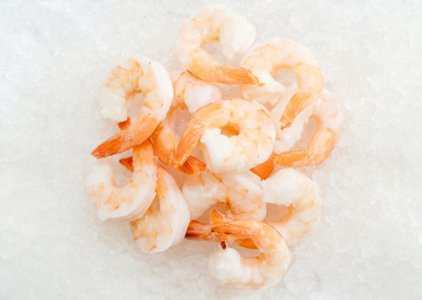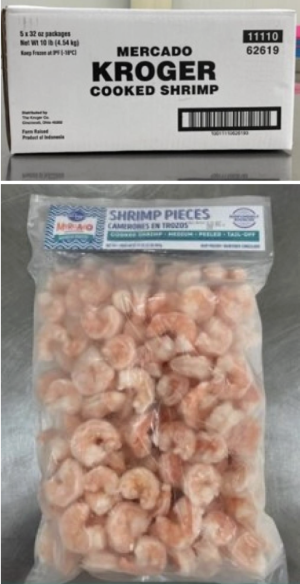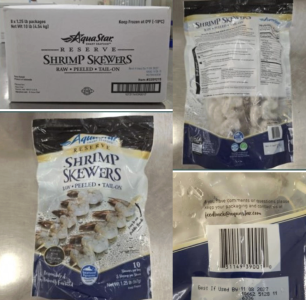Over 85,000 bags of shrimp recalled for potential radiation risk—here’s what you need to know
By
Veronica E.
- Replies 0
If shrimp is a staple in your kitchen—whether tossed in pasta, served up on the grill, or tucked into tacos—it might be time to take a closer look in your freezer.
A major seafood supplier has issued a nationwide recall of frozen shrimp products sold at dozens of grocery store chains across the country.
The reason? Potential contamination with cesium-137, a radioactive substance linked to serious health risks.
While no illnesses have been reported so far, the FDA has launched an investigation, and the supplier has pulled more than 85,000 bags from store shelves.
Here's everything we know so far and what steps you should take if you’ve purchased any recently.

The recall was announced by AquaStar Corp, a Seattle-based seafood distributor, after concerns arose that the shrimp had been "prepared, packed, or held under insanitary conditions."
The FDA posted the official recall notice on September 21, 2025.
The affected shrimp may have been contaminated with cesium-137—a radioactive chemical that occurs as a byproduct of nuclear fission.
While trace levels of cesium-137 are naturally present in the environment, repeated or prolonged exposure can raise the risk of burns, radiation sickness, and even certain cancers.
The recalled shrimp was distributed to a wide network of Kroger-owned grocery stores across the US.
This includes:
If you shop at any of these stores, check your freezer for shrimp purchased between June 12 and September 17, 2025 in the following states:
Alabama, Alaska, Arizona, Arkansas, California, Colorado, Georgia, Idaho, Illinois, Indiana, Kansas, Kentucky, Louisiana, Michigan, Mississippi, Missouri, Montana, Nebraska, Nevada, New Mexico, Ohio, Oregon, South Carolina, Tennessee, Texas, Utah, Virginia, Washington, West Virginia, Wisconsin, and Wyoming.
The recall includes several different shrimp varieties. Here are the product names, package details, and identifying codes:
1. Kroger Raw Colossal EZ Peel Shrimp (2-pound bags)

2. Kroger Mercado Cooked Medium Peeled Tail-Off Shrimp (2-pound bags)

3. AquaStar Raw Peeled Tail-On Shrimp Skewers (1.25-pound bags)

Cesium-137 is a radioactive isotope used in some medical and industrial equipment.
It's also a byproduct of nuclear energy production and weapons testing.
While most people are exposed to only trace environmental levels, food contaminated with higher concentrations of cesium-137 poses significant risks, especially with repeated consumption.
The contaminated shrimp came from PT. Bahari Makmur Sejati (BMS Foods) in Indonesia, which is now under an FDA import alert—blocking all future shipments from entering the country until safety measures are met.
If you find any of the products listed above in your freezer, do not consume them.
The FDA recommends either throwing them away or returning them to the store where you purchased them for a full refund.
For questions, you can contact AquaStar Corp at 1-800-331-3440, Monday through Friday, 8 a.m. to 5 p.m. (Pacific Time).
If you have health concerns related to possible radiation exposure, contact your doctor.
You can also report any suspected adverse effects or file a complaint via the FDA's Consumer Assistance Portal.
While food recalls are not uncommon, most involve bacterial contamination like listeria or salmonella.
Chemical or radioactive recalls are much rarer—but not unheard of.
In this case, the recall underscores the importance of routine inspections and testing of imported food products.
The swift action from the FDA and AquaStar shows that safeguards are in place to protect public health.
Here are a few steps you can take to stay ahead of food safety issues:
Staying informed about food recalls is one of the simplest ways to protect yourself and your loved ones.
Whether you regularly buy frozen seafood or just want to stay on the safe side, it's worth taking a few minutes to double-check your freezer.
If you recognize any of the recalled shrimp products in your home, don’t hesitate to take action—and be sure to share the news with friends and family who may have purchased them too.
Read next:

Have you ever had to return or discard a favorite food item after a recall? Do you have a system for tracking what's in your fridge or freezer? At The GrayVine, we’d love to hear how you stay on top of food safety—or any questions you might have about this latest recall. Keeping your home safe starts with staying informed and sharing updates with loved ones.
A major seafood supplier has issued a nationwide recall of frozen shrimp products sold at dozens of grocery store chains across the country.
The reason? Potential contamination with cesium-137, a radioactive substance linked to serious health risks.
While no illnesses have been reported so far, the FDA has launched an investigation, and the supplier has pulled more than 85,000 bags from store shelves.
Here's everything we know so far and what steps you should take if you’ve purchased any recently.

Shrimp products from various brands and stores are under recall due to potential contamination concerns. Image Source: Pexels / Deane Bayas.
Why the shrimp recall was issued
The recall was announced by AquaStar Corp, a Seattle-based seafood distributor, after concerns arose that the shrimp had been "prepared, packed, or held under insanitary conditions."
The FDA posted the official recall notice on September 21, 2025.
The affected shrimp may have been contaminated with cesium-137—a radioactive chemical that occurs as a byproduct of nuclear fission.
While trace levels of cesium-137 are naturally present in the environment, repeated or prolonged exposure can raise the risk of burns, radiation sickness, and even certain cancers.
Also read: Bought shrimp recently? Over 26,000 packages recalled for radioactivity—Walmart’s second shrimp pull this season amid seafood safety concerns
Where the shrimp was sold
The recalled shrimp was distributed to a wide network of Kroger-owned grocery stores across the US.
This includes:
- Kroger
- Ralphs
- Fred Meyer
- Smith’s
- King Soopers
- Fry’s
- Mariano’s
- Food 4 Less
- Dillons
- QFC
- City Market
- Baker’s
- Gerbes
- Jay C
- Metro Market
- Pay Less Supermarkets
- Pick ‘n Save
- Foodsco
If you shop at any of these stores, check your freezer for shrimp purchased between June 12 and September 17, 2025 in the following states:
Alabama, Alaska, Arizona, Arkansas, California, Colorado, Georgia, Idaho, Illinois, Indiana, Kansas, Kentucky, Louisiana, Michigan, Mississippi, Missouri, Montana, Nebraska, Nevada, New Mexico, Ohio, Oregon, South Carolina, Tennessee, Texas, Utah, Virginia, Washington, West Virginia, Wisconsin, and Wyoming.
Also read: Are the frozen shrimp in your freezer hiding danger? Shocking FDA warning for Walmart shoppers
Specific products and packaging to look for
The recall includes several different shrimp varieties. Here are the product names, package details, and identifying codes:
1. Kroger Raw Colossal EZ Peel Shrimp (2-pound bags)
- Transparent printed bag with a blue band at the top, yellow and red accents
- UPC: 20011110643906
- Lot codes/Best If Used By dates:
- 10662 5085 10 — 03/26/2027
- 10662 5097 11 — 04/07/2027
- 10662 5106 11 — 04/06/2027
- 10662 5107 10 — 04/17/2027
- 10662 5111 11 — 04/21/2027
- 10662 5112 10 — 04/22/2027
- 10662 5113 10 or 11 — 04/23/2027
- 10662 5114 10 or 11 — 04/24/2027

Raw colossal shrimp like those shown here are included in the recent recall—check packaging details carefully before use. Image Source: FDA.
2. Kroger Mercado Cooked Medium Peeled Tail-Off Shrimp (2-pound bags)
- Clear plastic bag with a white label and green stripes
- UPC: 011110626196
- Lot codes/Best Before dates:
- 10662 5112 11 — 10/22/2027
- 10662 5113 10 — 10/23/2027

Kroger Mercado Cooked Medium Peeled Tail-Off Shrimp is one of the products affected by the nationwide recall. Image Source: FDA.
3. AquaStar Raw Peeled Tail-On Shrimp Skewers (1.25-pound bags)
- Printed bag with a black top, blue bottom, and images of shrimp skewers
- UPC: 731149390010
- Lot codes/Best If Used By dates:
- 10662 5127 10 — 11/07/2027
- 10662 5128 11 — 11/08/2027
- 10662 5133 11 — 11/13/2027
- 10662 5135 10 — 11/15/2027

AquaStar Raw Peeled Tail-On Shrimp Skewers are among the recalled items flagged for potential contamination. Image Source: FDA.
Also read: Double recall alert: FDA flags health risks in popular seafood items
What cesium-137 is and why it matters
Cesium-137 is a radioactive isotope used in some medical and industrial equipment.
It's also a byproduct of nuclear energy production and weapons testing.
While most people are exposed to only trace environmental levels, food contaminated with higher concentrations of cesium-137 poses significant risks, especially with repeated consumption.
The contaminated shrimp came from PT. Bahari Makmur Sejati (BMS Foods) in Indonesia, which is now under an FDA import alert—blocking all future shipments from entering the country until safety measures are met.
Also read: A new alert is affecting grocery favorites—here’s what you need to know before your next meal
What to do if you have recalled shrimp at home
If you find any of the products listed above in your freezer, do not consume them.
The FDA recommends either throwing them away or returning them to the store where you purchased them for a full refund.
For questions, you can contact AquaStar Corp at 1-800-331-3440, Monday through Friday, 8 a.m. to 5 p.m. (Pacific Time).
If you have health concerns related to possible radiation exposure, contact your doctor.
You can also report any suspected adverse effects or file a complaint via the FDA's Consumer Assistance Portal.
Also read: Shopper finds frozen shrimp for just $1.25 at Dollar Tree—could they really be from Whole Foods? Find out now!
Are recalls like this unusual?
While food recalls are not uncommon, most involve bacterial contamination like listeria or salmonella.
Chemical or radioactive recalls are much rarer—but not unheard of.
In this case, the recall underscores the importance of routine inspections and testing of imported food products.
The swift action from the FDA and AquaStar shows that safeguards are in place to protect public health.
Also read: Frozen favorites pulled from shelves—here’s why you should check yours
How to stay alert and safe
Here are a few steps you can take to stay ahead of food safety issues:
- Check federal recall lists regularly. You can find updated notices on the FDA and USDA websites.
- Sign up for store alerts. Many grocery chains offer recall notifications by email, text, or app.
- Be cautious with packaging. Avoid any products with broken seals, odd smells, or discolored contents.
- Follow safe cooking practices. Proper storage and cooking temperatures go a long way toward preventing foodborne illness.
Staying informed about food recalls is one of the simplest ways to protect yourself and your loved ones.
Whether you regularly buy frozen seafood or just want to stay on the safe side, it's worth taking a few minutes to double-check your freezer.
If you recognize any of the recalled shrimp products in your home, don’t hesitate to take action—and be sure to share the news with friends and family who may have purchased them too.
Read next:
- What’s lurking inside Walmart’s chicken nuggets? Customers are furious at this alarming discovery!
- Salmonella outbreak prompts expanded frozen vegetable recall
- Is your morning coffee safe? Urgent recall issued over possible glass contamination
Key Takeaways
- AquaStar Corp has recalled over 85,000 bags of frozen shrimp sold at Kroger and its affiliated grocery stores due to potential radioactive contamination with cesium-137.
- The affected products include multiple shrimp varieties with specific lot codes, sold between June and September 2025 in over 30 US states.
- The contaminated shrimp was processed in Indonesia by PT. Bahari Makmur Sejati, which is now under an FDA import alert until safety standards are met.
- Consumers are urged to avoid eating the recalled shrimp, return it for a refund, and consult a doctor if they suspect radiation exposure.
Have you ever had to return or discard a favorite food item after a recall? Do you have a system for tracking what's in your fridge or freezer? At The GrayVine, we’d love to hear how you stay on top of food safety—or any questions you might have about this latest recall. Keeping your home safe starts with staying informed and sharing updates with loved ones.






